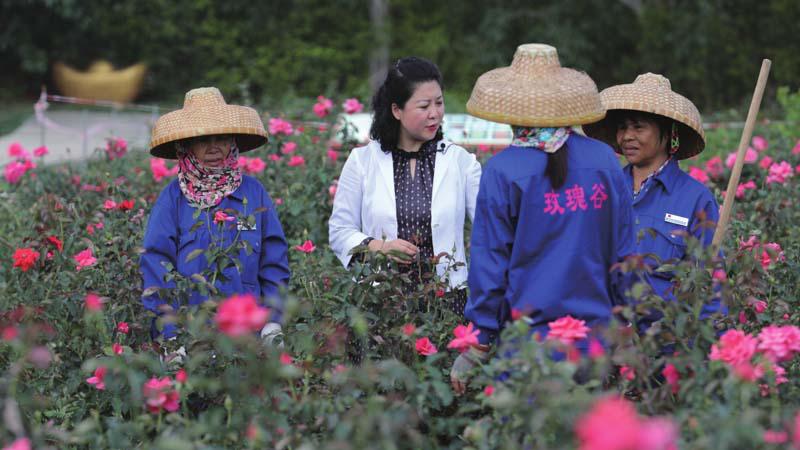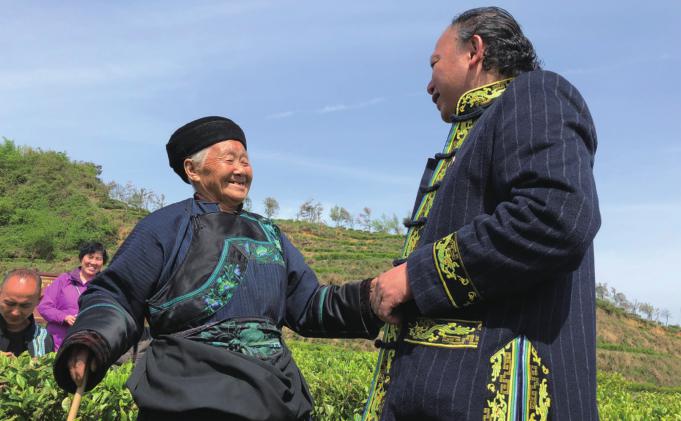ROAD OUT OF POVERTY
2019-03-27
China has set the goal to eliminate poverty by 2020. Across the country, particularly in the vast rural areas, many people are contributing to this arduous drive. Among them, Yang Ying from south Chinas Hainan Province and Long Xianwen from central Chinas Hunan Province have championed programs to lift impoverished populations out of destitute situations. During this years session of the National Peoples Congress, the two deputies sat down with Beijing Review reporter Yuan Yuan and shared their stories.
Rosy future
Yang Ying brought seasoned suggestions to the annual legislative session held in Beijing on March 5-15.
As the founder of Hainan Rose Valley Industrial Development, Yang has several ideas on how to develop tourism in rural areas and help more rural people out of poverty. For more than a decade, she has devoted herself to planting roses and de- veloping a rose valley in villages in Sanya City of tropical island Hainan Province, which has made the lives of people in these villages better.
The development of the rose valley is a typical example of Chinese peoples efforts to alleviate poverty. Figures from the National Bureau of Statistics show that by the end of 2018, the number of rural people in poverty stood at 16.6 million. With Chinas pledged goal of lifting 10 million people out of poverty each year, it expects to eradicate poverty nationwide by 2020. China lifted 13.86 million more people out of poverty in 2018 alone.
When Yang went to Sanya in 2006 for the fi rst time, she already ran a big fl ower business in Shanghai and simply wanted to grow roses there since the warm weather was perfect for growing all year round, unlike Shanghai where the rose season ended in November.
Her initial plan changed when she saw a little girl carrying an even younger boy working in the fields. Yang asked why the girl didnt go to school and the locals told her that the girls family was too poor to afford it.
“It was at that moment that I made up my mind to stay and do something for them,” Yang told Beijing Review. As a rose dealer, Yang began with a rose plantation project.
After two years of repeated failures of trying to tame the rose to the local temperature, Yangs team fi nally saw roses take root in Sanya. In 2009, Yangs company rented 184 hectares of farmland from local villagers to grow roses and hired more than 500 village workers.
“Bohou was a rather needy village back then,” Yang recalled. “The farmers only planted vegetables in the fi elds and could hardly make ends meet.” Yangs plan didnt get much support from the local farmers in the very beginning, however. “We did a lot of explaining and negotiations,” Yang said.“Rising incomes of farmers finally proved that our project could bring solid benefi ts.”
In April 2013, President Xi Jinping visited Yangs rose valley and made a remark that got widespread coverage in China:“Only when ordinary locals begin to lead a moderately prosperous life can we call it a true moderately prosperous society.”
Encouraged by his remark, Yang endeavored to branch out her business to a tertiary industry of rose products like rose jam, rose cake, rose tea and rose oil; in 2014, tourism was added to the list of ventures. In 2018, there were 1.5 million visitors to the rose valley, which now boasts more than 300 varieties of roses.
Last year, as a newly elected NPC deputy from Hainan, Yang visited almost all the villages engaged in tourism development in the province and made suggestions based on her research.
“Many of the villages are more or less alike without distinct features,” Yang said.“Many have put more effort into looking pretty rather than developing their own unique attractions, resulting in low tourism revenue.”
Yang also suggested involving more of the local people in boosting the vitality of their villages by setting up a regular organic market for both locals and tourists.
“Roses are a lovely business and I hope more rural people in the rose valley can make a good living from it,” Yang added.
Linked in
Long Xianwen, the 52-year-old Secretary of the Communist Party of China Niujiaoshan Village Branch in Guzhang County of Hunan Province, submitted his suggestion at this years NPC annual session to explore more ways of implementing policies on rural vitalization in remote and mountainous villages, where transportation and infrastructure conditions are quite limited.
“President Xi stressed many times that lucid waters and lush mountains are invaluable assets,” Long said. “We have lush mountains in our village and we need to fi gure out ways to turn them into ‘gold mountains for the villagers.”
Niujiaoshan enjoys natural advantages for tea plantation, with a history of its tea being served to ancient Chinese royalty. But the locals ignored the tea industry and left the village to work in bigger cities, and Long was among them. “We were sitting on a gold mountain but didnt know it,” he said.
In 2008, Long founded the first tea plantation cooperative in the village. At the time, there were 1,360 registered residents in the village and the average annual income per person was less than 800 yuan($119). The village didnt even have access to tap water. However, Longs idea of planting tea trees in the village didnt get much support from many villagers who preferred to grow “real food.”
Long plowed almost all his savings into the cooperative and spared no effort in persuading the villagers to join. In 2014, the cooperative finally started to make prof its. By 2016, the whole village was lifted out of poverty and by 2018, the average annual income per person increased to 13,618 yuan ($2,029). Now, the tea grown in the village is exported to many countries and regions, especially those taking part in the Belt and Road Initiative. The tea from the village has once again returned to its glory days.
In 2018, Long visited many enterprises in Hunans rural areas and some tea growing areas in Zhejiang Province. He brought a type of white tea seed from Zhejiang and promoted it in his village.
He also brought his suggestions of sustainable development of the tea industry to the 13th NPC and advocated for improved local tourism and better local traffi c conditions.
“The Internet has been an important impetus for the development of our village, which is located in a remote area with limited transportation,”Long said. “Without the Internet, our tea wouldnt be widely known or get a chance to travel the world.”
